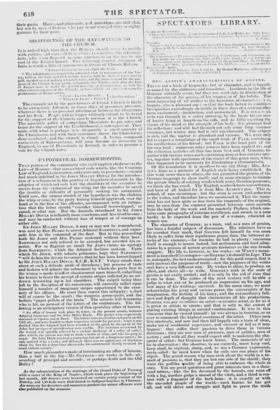either side. women are.
Sir JOHN MILLEY DOYLE, it may or may not be remembered, The character of GOETHE, as a man, and as a man of genius, was sent by Don PEDRO to arrest Admiral SARTORI us, and super- has been a fruitful subject of discussion. His admirers have so sede him in the command of the fleet. But in this proceeding far overshot their mark, that GOETHE felt himself he was more both Sir JOHN and Don PEDRO reckoned without their host ; likely to suffer from their injudicious praise than the bitterest at- SARTOR1US not only refused to be arrested, but arrested his ar- tacks of his enemies,—for enemies he had in plenty : eminence• rester. For so flagrant an insult Sir JOHN claims an apology itself is enough to insure hatred, but enthusiasm and loud admi- from SARTORIUS ; which the Admiral declines making. Upon ration by a process of nature generate traducers as the sun breeds which Sir JOHN, with infinite politeness, begs that SARTORIUS maggots. His life is, however, in his works : on WREN'S monu- " -will do him the favour to conceive that he has been horsewhipped ment is inscribedarcumspice—on GOETHE'S it should be Lege. This by Sir JOHN MILLEY DOYLE, K.C.B., K.S.T." Vulgar minds may is, unhappily, the last modeattemptcd; for this good reason, that it sneer at such a delicate mode of thrashing; but persons of taste only answers the purposes of truth—now the purposes of the writer and fashion will admire the refinement by which the party first in may have a very different aim. He wishes to shine, to produce an the wrong is made to inflict chastisement upon himself, cudgelling effect, and above all—to write. GOETHE'S rank in the scale of his brains to fancy the receipt of certain stripes inflicted ;by an air. genius is not easily settled; and it is only by the aid of time that drawn horsewhip upon his shoulders. The culprit being thus it can be done. The critics of the next century will be able ()- left to the discipline of his conscience, will naturally inflict upon judge to what extelt he produced an impression on his age, and Ilimself a number of imaginary stripes apportioned to the enor- how many of his writings survived. In the mean time, we must mity of his offbnce. He must then resent this indignity; a duel acknowledge his great and various power, the universality of his will of course be the result ; the weapons goose-quills, and the imagination, the fertility of his fancy, and the extraordinary full- bullets "paper pellets of the brain." The seconds will determine ness and depth of thought that characterize all his productions. who is hit, on perusal of the letters of the combatants. The foh GOETHE was par excellence an artist—a creative artist, as far as it lowing is an anticipatory version of this epistolary affair of honour. is given to artists to create; and that is only to the extent of "An affair of honour took place by letter, in the present month, between placing existing things in untried combinations. It was in this Admiral Sam, ions and Sir John Milky Doyle. The parties were respectively character that he viewed himself: he was always in training, so as stationed at Oporto and at Brest. The letters were received by each party on the ever to command the highest exertions of the artist. Other men 12th ult., and were handed to their respective seconds for persusal ; when it was live carelessly, and now and then fall happily into a train of ideas, decided that the Admiral had been wounded to the quick by the epistle of Sir make use of accidental experience, and succeed or fail as it may John, but no signs of fl((1rlifieatn wert! visible. The irritation occasioned by the wound was speedily relieved by a violent dischatge of a volley of oaths; happen: they suffer their passions to drive them in various after which, the patient was able to drink a bottle of wine, and take his grog as directions; they are now men of pleasure, men of politics, men of usual. Sir John Doyle received a contusion, hut not of a dangerous nature; he society ; and with all they would expect still to maintain the eha- ouly noticed it by a smile; and althm01 there was an appearance of blackness racter of artist : but GOETHE knew better. The materials of art about his face for a short time afterwaids, his countenance shortly resumed its lie in observation : the observer, to see correctly, must keep cool,
















 Previous page
Previous page